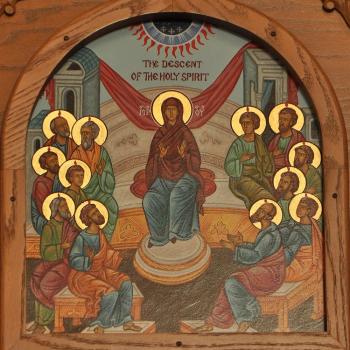To elaborate further, it is possible to see this statement and closing off of the self against grace to be the closing in on the self, self-attachment, which rejects the bountiful graces of God’s love which is brought to us by the Holy Spirit. If we live and act and affirm through our actions bitterness and hatred against others, we are closing ourselves off from love, and the grace which comes from love. Thus, if we follow the path of such unlove, we risk perdition. Or, as Jesus said, when we find ourselves holding on to bitterness against others, we end up risking hellfire: “But I say to you that every one who is angry with his brother shall be liable to judgment; whoever insults his brother shall be liable to the council, and whoever says, `You fool!’ shall be liable to the hell of fire “(Matt. 5:22 RSV). It is because we hold out against our brethren with unlove, and hold out to that unlove instead of forgiving them, we find ourselves turning against love and the grace it brings. ”Any one who hates his brother is a murderer, and you know that no murderer has eternal life abiding in him” (1 Jn. 3:15 RSV). It is love that purifies us from sin. Therefore, we must open ourselves to others in love, and work to help them through that love, and cover up their own sins through our love, so that we let love define us, making us open to the graces of such love.. “My brethren, if any one among you wanders from the truth and some one brings him back, let him know that whoever brings back a sinner from the error of his way will save his soul from death and will cover a multitude of sins” (James 5:19-20 RSV). St John of Kronstadt contemplated this truth, writing:

When you are struck by other people’s suffering, and the contraction of their souls, so that you are induced to pray for them with a pitying and contrite heart, pray to God to have mercy upon them and to forgive them their sins, as you would pray for the forgiveness of your own sins – that is, implore God with tears to pardon them; likewise pray for the salvation of others as you would pray for your own salvation. If you attain to this and make it a habit, you will receive from God an abundance of spiritual gifts, gifts of the Holy Ghost, Who loves the soul that cares for the salvation of others, because He Himself, the most Holy Spirit, wishes to save us all in every possible way, if only we do not oppose Him, and do not harden our hearts.[1]
The Holy Spirit is the Spirit of love. The Holy Spirit applies grace to us, so that we receive the forgiveness of sins, and this, according to Walter Hilton, is why the Holy Spirit is seen as the Spirit of love, for forgiveness and mercy is united with love:
For this reason it is said that the justification of a sinful soul through forgiveness of sins is ascribed and appropriated principally to the working of the Holy Spirit, for the Holy Spirit is love, and it is in the justification of a soul our Lord Jesus shows his greatest love to a soul, for he does away with all sin and unites the soul with himself. And this is the best thing that he can do for a soul, and therefore it is appropriated to the Holy Spirit.[2]
It is denial of forgiveness, for ourselves as well as for others, which allows for no forgiveness; it is closing off and attaching oneself purely to oneself that someone will find themselves perishing in eternity for they denied the Spirit with its love which forgives purifies them from their sin.
This is why we must avoid all form of unlove the best we can. We must open ourselves to the grace of love in this life. For it is how we act, how we engage the virtues in charity, that we slowly define who and what we are, and if we turn to bitterness and hatred, closing ourselves off to the charity which we should have for all, we risk reifying hate and establishing the dark shell of sin which divides us from the paradise of the Spirit. The more we hold on to such malice, the more we form and shape ourselves in the image of malice, and the more we risk perdition. The more we hold onto our bitterness and rage against our brother or sister, the more we find ourselves on the path towards perdition. So long as we live, there is room to change. There is grace which we can use to help break down and crucify our malice, and so long as we have not defined ourselves for eternity, we still have room to open up to love and be saved.
Needless to say, we must be careful. The more we try to act holy, the more we can hold on to ourselves and set ourselves up against the Spirit and against the love which redeems. When we try to bring justice to the world, ignoring the law of love, we allow hatred to take its root in that supposed justice and end up making a mockery of all that is good. Indeed, the more we try to seek holiness apart from love, the more malignant we can become, and the greater danger we find ourselves falling into the fires of hell. Thus, Richard of St. Victor wisely explained:
But even though all malignity is evil, the worst form of this evil is the one that administers its torments under the form of holiness. Often when a person rages against a neighbor because of the vice of anger or venom of envy, an idea forms in his head that he does this because of his zeal for justice. Anyone who has been injured by his neighbor cannot yet easily look at him with an innocent eye. He is displeased with whatever offense he thinks was done by his neighbor. At nearly every moment he accuses him in his private thoughts. Every day innumerable causes flood his mind that prove his neighbor’s guilt, and many reasons come to mind that convince him that the guilty party must be punished. And often this evil grows in him to the point that he believes that he will be guilty before God unless he corrects his neighbor very severely and reproves his neighbor for his perversity. [3]
The more judge others as if we were the judge, and seek to punish them, our hearts grow cold, our love vanishes, and we risk perdition ourselves. It is not that we should deny justice, but we should know that mercy and grace must be behind all justice. Our actions should seek to make others instead of nihilistically seeking to eliminate whatever good is left in them so that evil thrives. The more we deny love, the more we disengage ourselves from the good, and the more our idea of justice ends up being a perversion of justice. When all we render to others is hate which allows no mercy or grace, we will be making ourselves reflect such hate, and so close ourselves off from the Holy Spirit of love.
Thus, we must do as as Peter wisely proclaimed: to be sober through love, so that in and through such love, sins are forgiven in others and in ourselves:
The end of all things is at hand; therefore keep sane and sober for your prayers. Above all hold unfailing your love for one another, since love covers a multitude of sins. Practice hospitality ungrudgingly to one another. As each has received a gift, employ it for one another, as good stewards of God’s varied grace: whoever speaks, as one who utters oracles of God; whoever renders service, as one who renders it by the strength which God supplies; in order that in everything God may be glorified through Jesus Christ. To him belong glory and dominion for ever and ever. Amen (1 Ptr. 4:7-11 RSV).
By acting in love, we let the grace of the Holy Spirit come to us and justify; but when we close ourselves, and root out such love from our activity, we form a barrier between ourselves and the grace of the Holy Spirit. If we continue with such unlove, we reinforce that barrier; and if we die with such a barrier, we risk making it our everlasting statement of ourselves in relation to God. This, then, is what is to be understood as blasphemy of the Holy Spirit of which there is no forgiveness.
[1] St. John of Kronstadt, My Life in Christ. Trans. E.E. Goulaeff (Jordanville, NY: Holy Trinity Monastery, 2000), 31.
[2] Walter Hilton, The Scale of Perfection. Trans. John P.H. Clark and Rosemary Dorward (New York: Paulist Press, 1991), 265.
[3] Richard of St. Victor, “Tractates on Certain Psalms” in Victorine Texts in Translation: Writings on the Spiritual Life. ed. Chisropher P. Evans (Hyde Park, NY: New City Press, 2014), 164.
Stay in touch! Like A Little Bit of Nothing on Facebook:
A Little Bit of Nothing
















